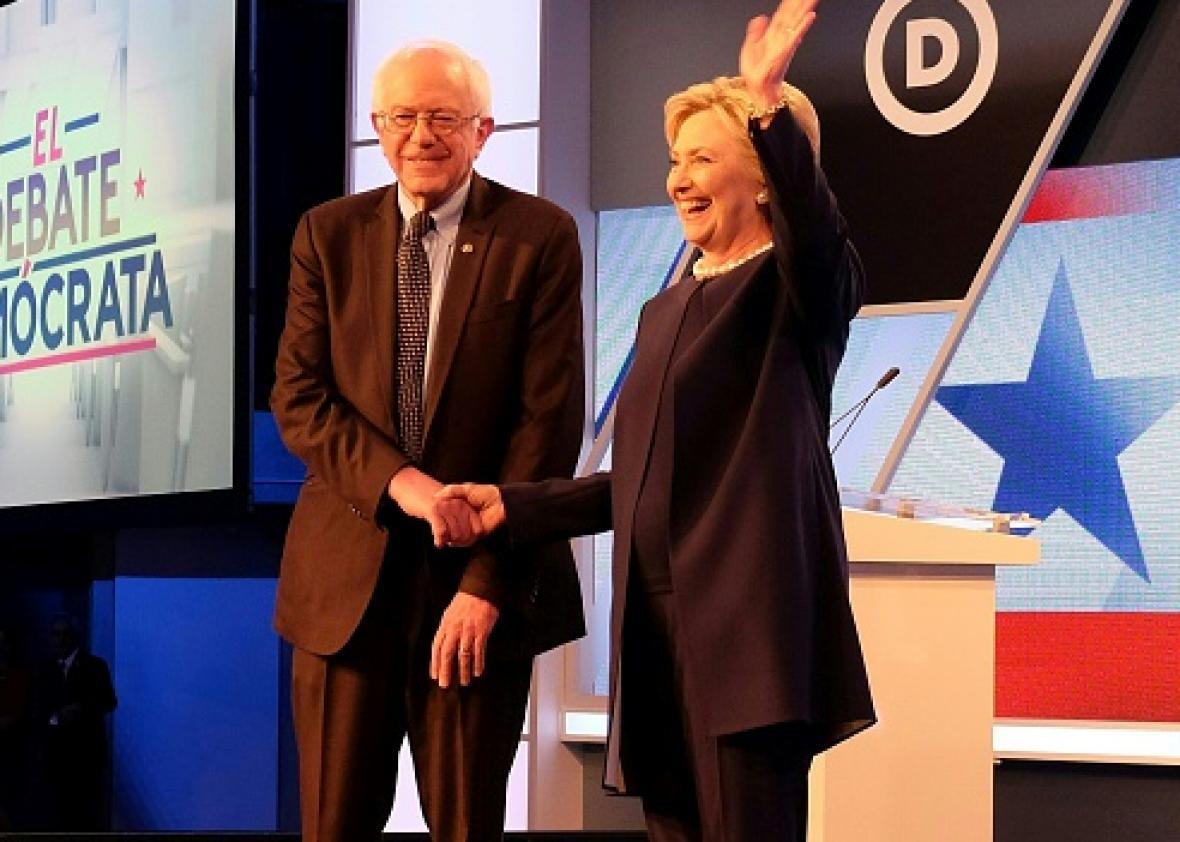The strength of the Hispanic vote in the Democratic primary is going to serve as a determinative force in the remainder of the contests between Hillary Clinton and Bernie Sanders. Florida’s vote on Tuesday, for one, will hinge largely on Hispanic voters. If Clinton can pull off the sizable win that’s expected of her there, she can crush whatever momentum Sanders built following his surprise win in Michigan. Or, if Sanders is still trailing Clinton by low triple-digits in pledged delegates by the time the California primary rolls around in June, a big win there could instantly erase his deficit.
What we saw in Wednesday’s Univision/Washington Post Democratic debate between Sanders and Clinton was a demonstration of how far to the left Democrats have moved on immigration policy in the past 10 years as Hispanic voters have become such a critical portion of the Democratic base. The face-off exposed what are now perceived as blemishes on both Sanders’ and Clinton’s records from the 2000s, blemishes for which they will each have to answer as the campaign hurtles, eventually, through California. And their disavowals of the previous positions will only heighten the eventual Democratic nominee’s contrast with either Donald Trump or Ted Cruz heading into a general election whose outcome hinges heavily on Democrats turning out Hispanic voters.
Much of the first half of the debate was focused on issues of immigration and the rights of undocumented immigrants. Both candidates had their strong moments, but they also each took lumps based on previous statements and positions they made when the Democratic Party was much more split on immigration issues—and when the party, frankly, was more conservative.
Clinton was asked about comments she made on a 2003 radio program in which she said she was “adamantly against illegal immigrants,” explaining how, if you “come up to Westchester, go to Suffolk and Nassau counties, stand on the street corners in Brooklyn or the Bronx, you’re going to see loads of people waiting to get picked up to go do yard work and construction work and domestic work.” It was the sort of harsh tone towards undocumented immigrants you no longer hear in national Democratic Party politics. Rather than address those comments, Clinton simply explained that she sponsored the DREAM Act in multiple congressional sessions and voted for the 2007 comprehensive immigration bill co-written by Sen. Ted Kennedy.
This deflection allowed Clinton, and the moderators, to pivot to Sanders’ vote against that 2007 comprehensive immigration package and the path to citizenship included in it. The moderators showed a clip of Sanders on Lou Dobbs’ CNN show in 2007—recall that Dobbs was the media’s pre-eminent anti-“amnesty” voice during that debate—saying, “if wages are going down, I don’t know why we need millions of people to be coming into this country as guest workers who will work for lower wages than American workers and drive wages down even lower than they are right now.” Even as recently as 2007, the Democratic coalition was split on immigration reform, with opposition coming from major labor unions. Sanders took labor’s side back then. By the 2013 reform effort, labor—and Sanders—had come around on the issue and supported reform.
Sanders chalked his 2007 “no” vote to abuses in guest-worker programs that were “akin to slavery.” He makes a strong point about H-2 guest-worker abuses, but that wasn’t the whole story of his opposition to the package, and Clinton called him out on it. “I think it’s very hard to make the case that Ted Kennedy, Barack Obama, me, La Raza, United Farm Workers, Dolores Huerta, and [other] leaders of the community would have promoted a bill that promoted modern slavery,” she said. “That was one of the many excuses used not to vote for the 2007 bill.” Clinton also confronted Sanders for a 2006 vote for a fringe amendment to protect the Minutemen, a fringe vigilante border-patrol group. Sanders responded that it was “horrific” to suggest he would ever support such a group. (Sanders’ spokesperson has told BuzzFeed that Sanders voted for it because he was told it was a “meaningless thing.”)
One of the most difficult moments of the night for Sen. Clinton, though, was a perfect microcosm of the prominent role Hispanic voters now play in the Democratic coalition. Univision moderator Jorge Ramos—the most powerful Latino journalist in the country—asked Clinton to “promise tonight that you won’t deport children and that you won’t deport immigrants who don’t have a criminal record, and this time could I get a yes-or-no answer?”
Clinton artfully avoided giving a direct answer, instead, saying things like “I do not have the same policy as the current administration does” regarding its raids on families with children.
“But again, yes or no?” Ramos followed up. “Can you promise you won’t deport children who are already here?”
“I will not deport children,” she finally said, looking uncomfortable as she said it.
It was an impressive display of questioning from Ramos and one that puts Clinton in a box should she have the opportunity to govern. Would-be President Hillary Clinton will be smoked in Hispanic media if her administration deports one child who is already here illegally, and you could see her recognize this as she said it onstage. This is not the sort of questioning on which leading Democratic candidates would cave in the 2008 election. But that was a different Democratic Party.
